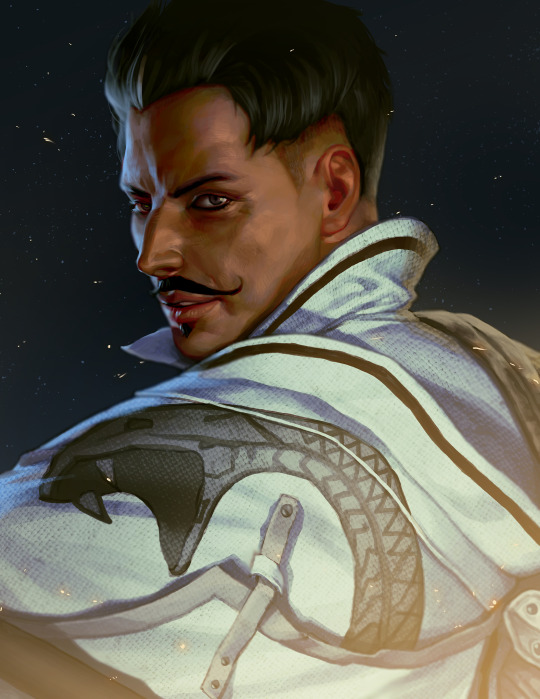#fortitudo
Text
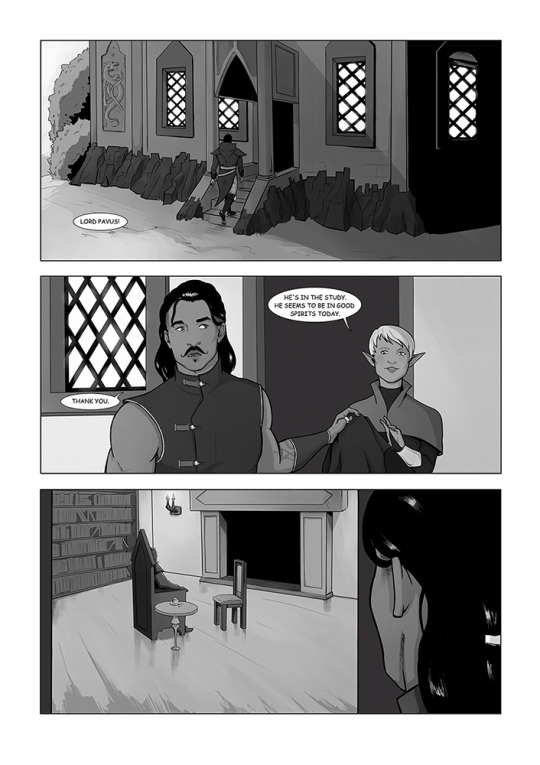
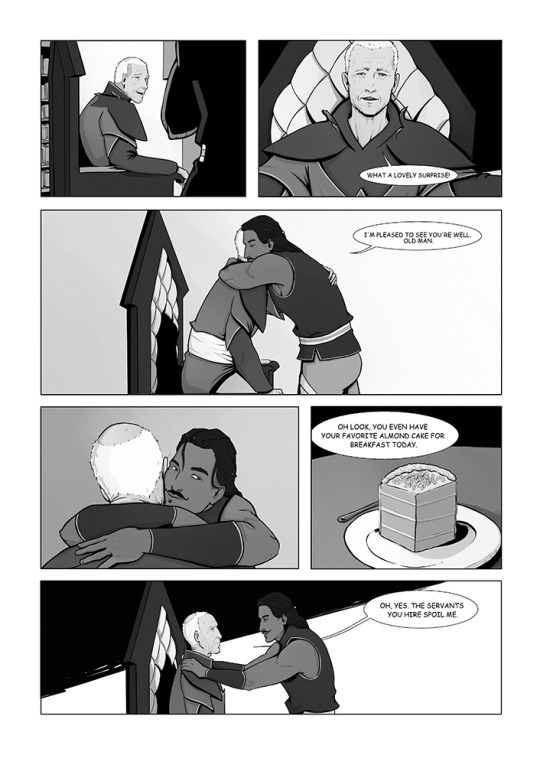
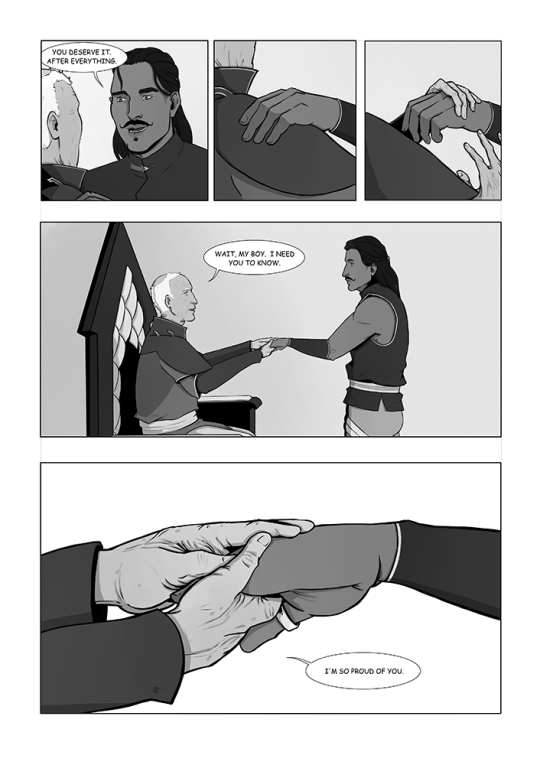

It’s been exactly 7 years since the idea of @dorianartbook was born while talking with @elidoo

It’s still a project I think of fondly, that brought me friends, great experience and raised over $20k USD for LGBTQ charities . Love for Dorian Pavus made it all possible!
#dragon age#dorian pavus#gereon alexius#dragon age inquisition#fortitudo born perfect#fortitudo#so many amazing artists in one project#friends made 🥹#some good in the world done#this is 7y old I’d redraw it completely now haha
118 notes
·
View notes
Text
Sapientia is (probably) the unluckiest Auditio ever:
Warning: The following post contains dismemberment of angels, torture of angels, spiders, decapitation, extreme violence against Auditios and heavy scenes of Sapientia's suffering. It is not recommended for people who are on the side of angels (or are an angel). 👁️👁️
▃▃▃▃▃▃▃▃▃▃▃▃▃▃▃▃▃▃▃▃▃▃▃▃
1 - He already suffers in his first appearance and is even attacked by his "ally", making the guy fall into the seas.
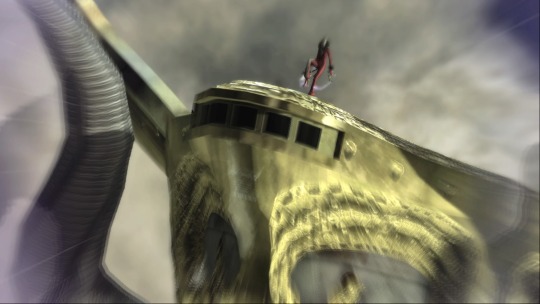
2 - He can't even finish his speech and gets choked up on the antenna.
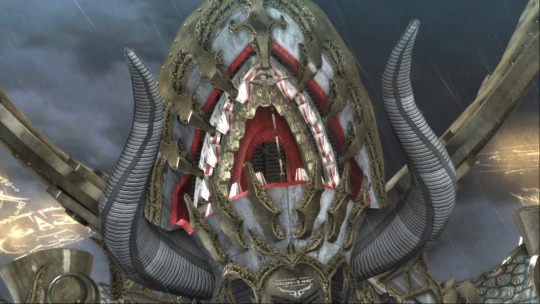
3 - Bayonetta summons "Phantasmaraneae" and is a giant spider. However, Sapientia seems to have some kind of "arachnophobia", because he even grunts when he sees her.

4 - Unfortunately, Bayonetta forces Sapientia towards his greatest fear and is punched when he tries to resist. However, that's not all, when he gets close to the Spider, the Spider breaks parts of his face and makes him lose the horns on his jaw, poor guy.
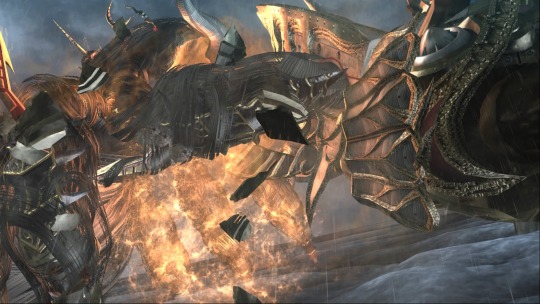
5 - And if that wasn't enough, Bayonetta rips poor Sapientia's wings off. Seriously, what's the deal with Cereza dismembering the Auditios? She rips off Fortitudo's dragon heads, rips off Temperantia's arms, cuts off Iustitia's "tongues" and rips off Sapientia's wings.
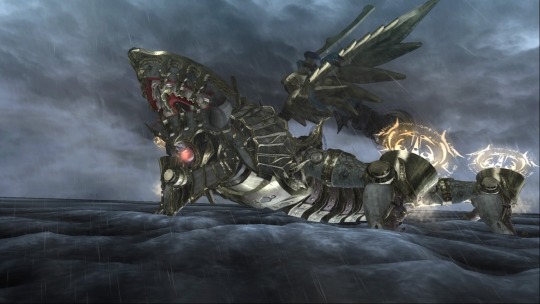
6 - In the last part of the fight, Bayonetta traps Sapientia in a giant spider web, has the guy devoured and cut in half by small spiders, causing the bastard to explode.
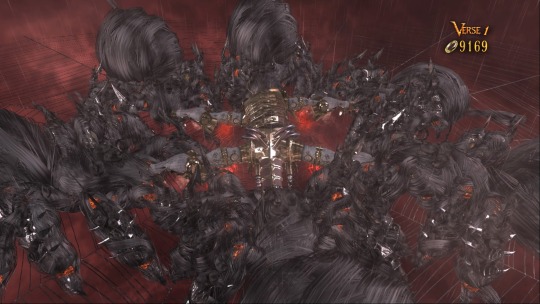
7 - Sapientia is still "alive", but he only has his head now and Bayonetta even broke his damn jaw. Let the guy use his jaw, come on. Oh, and he gets sent to Inferno afterwards, because "one Hell" just isn't enough for the guy.
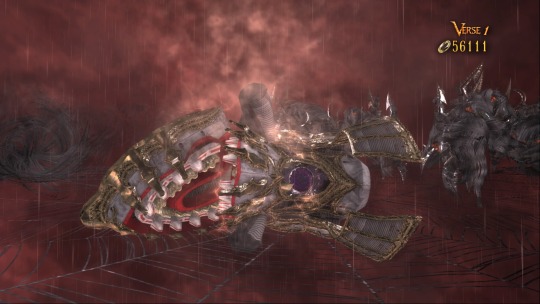
8 - However, that's not the end of Sapientia's suffering yet, because you still find a weaker version of him ("Green Sapientia" or "Prudence"). However, that's not enough for Bayonetta to feel sorry for him and the idiot is impaled alive because of her. The guy still explodes, leave him alone, for Jubileus' sake.
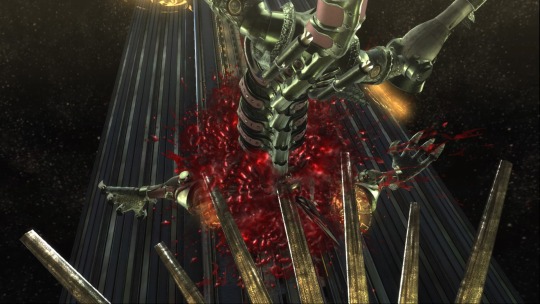
9 - Incredibly, he still suffers in Bayonetta 2 and the other Auditios gave Rosa and Cereza more work, because when Sapientia appears in the battle, Rosa already punches the guy and makes him be dragged to the ground.
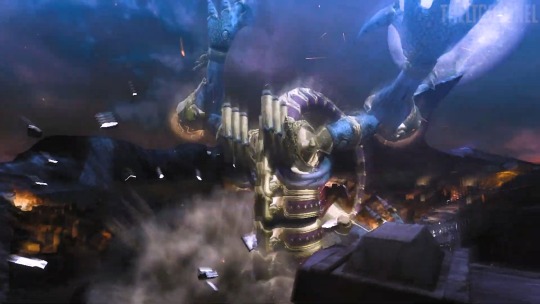
10 - To end Sapientia's suffering, he is held against his will by Rosa, takes a beating from Cereza and is even thrown into an angelic ship, making the guy explode, again.
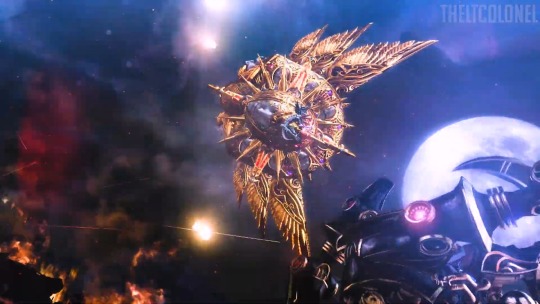
▃▃▃▃▃▃▃▃▃▃▃▃▃▃▃▃▃▃▃▃▃▃▃▃
As you can see, Sapientia is perhaps the Auditio that suffered the most among the other Auditios, because at least... the other Auditios still had body parts intact. Even in the past, Sapientia cannot be left alone and it still explodes at the end.
Sorry if my english sounds weird, it's just that english is not my main language.
P.S: No angels were harmed to make this post. ⛄
#Sapientia#Bayonetta#Bayonetta 2#Bayonetta 3#Cereza#Jeanne#Fortitudo#Temperantia#Iustitia#Angels#Angels And Demons#Platinum Games#Platinum#Nintendo#Witch#Witches#Umbra Witch#Witch Vibes#WitchyVibes#Press F To Pay Respects
27 notes
·
View notes
Text
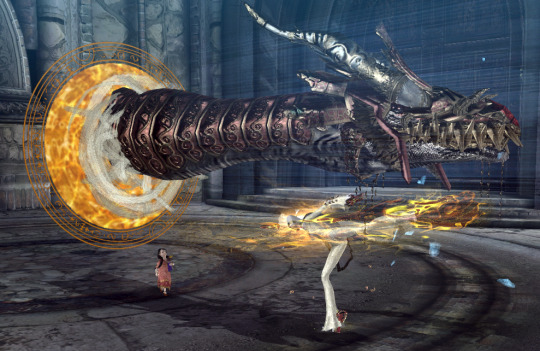
You ever want to kick a person with a dragon? Well now you can!
This is the first time I've made a proper custom model import mod for Bayonetta 1, I'm pretty proud of how it came out! :3
#Bayonetta#Bayonetta 1#Bayonetta Modding#Bayo Mods#Fortitudo#lol I really dont talk abt my modding hobby much here so I dont expect this post to go very far#Btw I also made the golden player effects mod thats also on nexus mods if anyone is interested
44 notes
·
View notes
Text
You think Balder made the Auditio the Board of Directors of Ithavoll? Was it just like:
Sapientia: Come on Fortitudo, spending more isn’t going to bring the profit margins down.
Temperantia: Sapientia is right, a little extra spending isn’t going to do anything.
Fortitudo: You’re one to talk Temperantia, how many paid vacations have you given yourself in the past year?
Temperantia, slamming a fist down on a huge table: That is none of your business!
Iustitia: Would you three shut the fuck up? I’m trying to file a libel lawsuit!
7 notes
·
View notes
Photo

One may question the ethics of cybernetic implants that use the human brain as hardware to run AI functions, but this process creates cyborgs that absolutely refuse to die.
The original plan was to quickly and cleanly take out Fortitudo’s organic head and sell the whole pristine cyborg body for a massive price on the black market. This extremely did not work. Fortunately, the price-gouging amounts of damage done to Fortitudo to finally stop him did not affect the final payoff to the surviving Inferno contractors: the profits were split in a tontine and most of the participants died because Fortitudo killed them with his teeth.
6 notes
·
View notes
Text
Bayonetta 3 angels & demons
Affinity third sphere angels
Acceptance third sphere angels
Accolade third sphere archangels
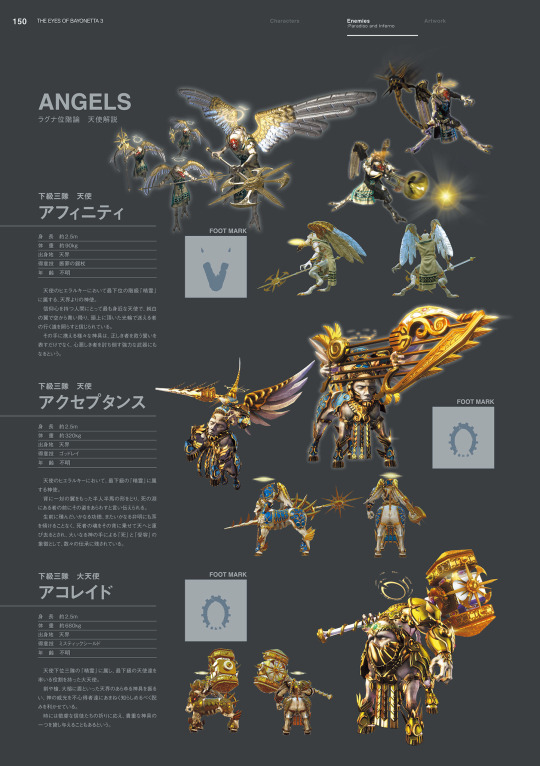
Beloved second sphere powers
Grace & glory second sphere virtues

Variance first sphere cherubim
Fortitudo auditio
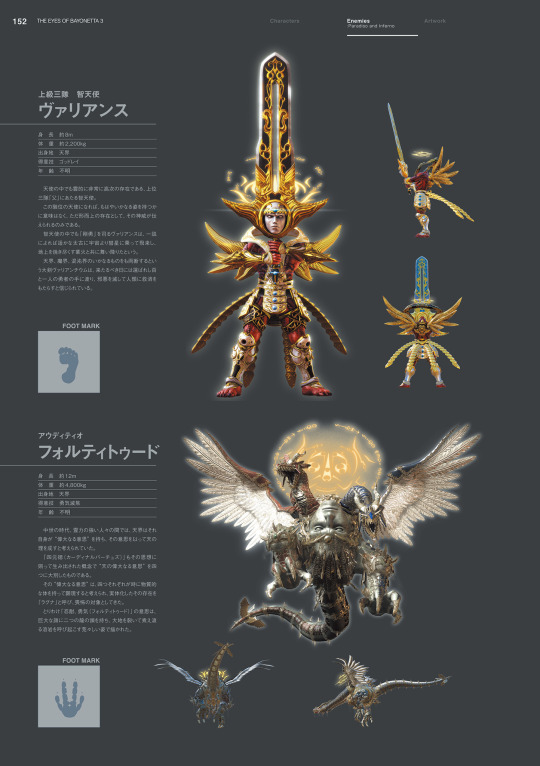
Golem occult device
Hideous craver of hatred
Pain driver of agony

#bayonetta 3#angel#demon#artbook#affinity#acceptance#accolade#beloved#grace#glory#variance#fortitudo#golem#hideous#pain
1 note
·
View note
Text
Not to talk about Bayonetta again but remember when she use to dismember bosses
#even Bayo 2 doesn't have much of this and I never see anyone complain about it#dismembering blood and violence. That's also why I loved Bayonetta#tearing a boss apart piece by piece#tearing off Fortitudo's dragon heads was THE moment I was like. Oh this is the best game ever.#and it only escalated from there tbh#we did have the eye with Insidious but that's it I think
3 notes
·
View notes
Text
honestly bayonetta angels and seraphs are so fun to look at everyone should just pick one that matches your aesthetic, I’ll go first:
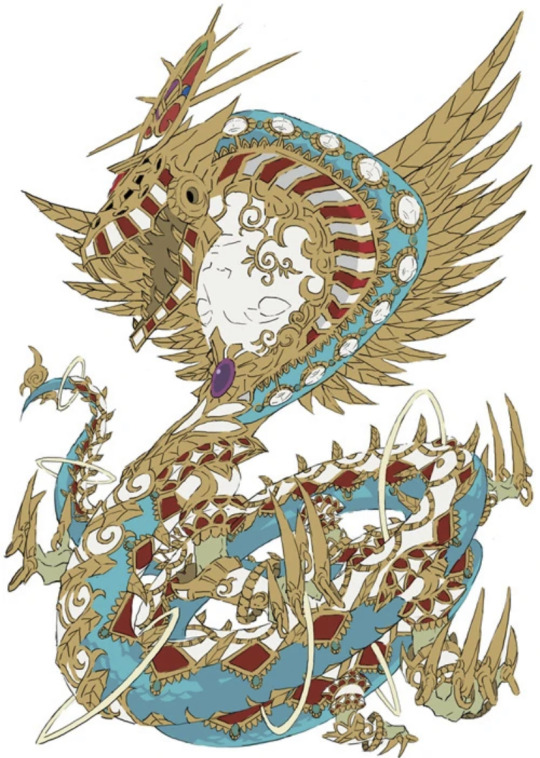
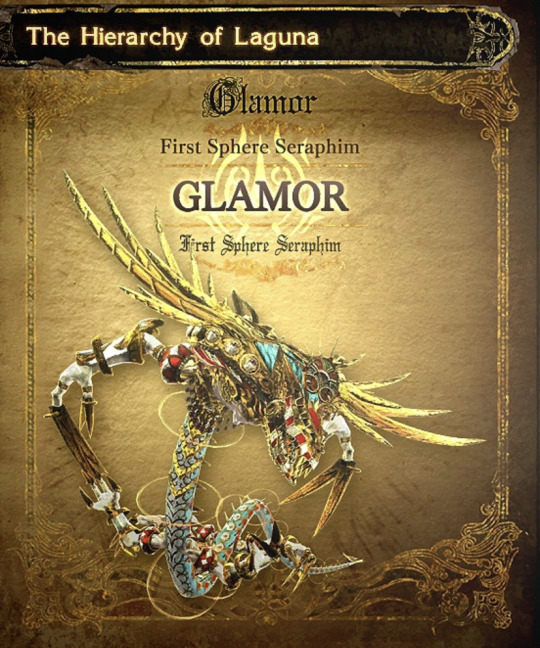
#Tbh nothing has ever beaten glamor I think this weird fucked up snake is cool#fortitudo is cool too
3 notes
·
View notes
Text
“Dad!” The title was called in unison as soon as the twins spotted Chrom, and a moment later the two dashed over to stand on either side of the man.

“We’ve been looking for you! Marc and I got you a present!” Morgan announced cheerfully before clapping her hands together, “Well actually we made you a present, because we couldn’t agree on what to get you.”

“I still think it would have been better to get you training things but...” “This counts as a training thing.” Morgan complained as Marc actually produced the mentioned present; a finely bound book with an ornate cover that looked like it might have been meant more for decoration than use. “Morgan and I created a copy of Mother’s favorite book, complete with her and our notes and had it bound. Mmmm, we know reading’s not usually your thing but...” “We had it bound fancy so you don’t have to feel bad if you don’t read it, just use it as decoration. If you’re ever in a pinch though, it’s not as good as having all three of us around, but kinda close.”
Happy Birthday Chrom || @convxction !
#veritas et fortitudo | morgan#clarere audere gaudere | marc#convxction#familia supra omnia | awakening#{ aka this got too long for an ask lol#but!! they wanted him to have their favorite thing. so they made it for him
3 notes
·
View notes
Text
Hail, Gabriel!
Messenger of the heavens,
The strength of a God is in your very name.
I beseech thee lend that Strength to the workings at hand,
For I am but a vessel through which power flows and seek your celestial aid.
Grant me your assistance and open the Pathways
For when the storms are raging and strength is failing, and still there is much to be done, you open the channels.
Giver of hope! Herald of news! Bringer of change!
Deliver my message unto the worlds, and grant grace so my will and works are as made to be.
Amen
—in honor of the Synaxis of St Gabriel the Archangel
2 notes
·
View notes
Text
Ethan Happ, un 4 Old School en Lugo
Ethan Happ, un 4 Old School en Lugo
El pasado 29 de junio, el usuario de Twitter @AgrasFernando (que si os va el baloncesto old school os recomiendo que sigáis) colgaba un tweet con un rumor, el posible fichaje de Ethan Happ por parte del Breogán.
Acto seguido colgaba otro tweet incluyéndome a mí, diciendo…este es uno de los tuyos.
https://twitter.com/AgrasFernando/status/1542143205738676225?s=20&t=lb7Nb7Nll2ZUFs2kLgZcGA
si no lo…

View On WordPress
#ACB#badgers#bbl#big ten#breogan#bulls#dinamo sassari#ethan happ#Fortitudo bolonia#juego de espaldas#LEGA#liga endesa#lugo#ncaa#old school#oly#olympiakos#riesen ludwigsburg#summer league#vanoli cremona#wisconsin
0 notes
Text
Fortitudian
[PT: Fortitudian]
An orientation for those who are gay for maverine genders, autonomous/autonomine genders and other outherine genders characterised by gender autonomy.
The name comes from the exoplanet Fortitudo, orbiting the star Libertas in the constellation of Aquila. It was chosen because both the name of the planet means "strength, fortitude" and the star that it orbits was named after the goddess of freedom and after freedom itself. In a sense, they can be seen as representing the strong sense of gender and the autonomy, self-governance and authenticity that characterises maverine and autonomine genders.
The flag:

#outherine orientations#maverine#autonomous genders#mogai orientation#liom orientation#maverique#autonomique
13 notes
·
View notes
Text
Inferring Fortitudo’s Character from Tiny Lore Scraps
SUPER SUMMARY: Fortitudo is awe-inspiringly lazy. He’s also the driving force of most major conflicts. At first this seems contradictory, but Fortitudo is willing to put monstrous amounts of effort into big laziness payoffs in the distant future, culminating in intentionally dying to avoid responsibility in the new world controlled by his faction.
Metaphysics
Given the world of Bayonetta is one where ordinary people cause giant metal missile stingrays and headless flying centaurs to spontaneously burst into existence by collectively feeling emotions strongly enough, magical people can literally stop time by having massive egos, and history changes by remembering it differently, Fortitudo may be more like a law of physics than an actual being. Since Fortitudo has a seemingly endless number of smaller, younger clones and reappeared with no explanation in Bayonetta 2 after being ripped into pieces and dragged into hell in the previous game, I feel like as long as human beings have the will to do something they extremely don’t want to do, Fortitudo continues existing.
Fortitudo is the spiritual manifestation of doing overtime at work until it turns dark. Of waking up every day next to someone you are mostly indifferent to, but still choosing to get into the same bed every night anyway. Of being ordered to perform what is indisputably a war crime, but you do it because it leads to fast victory. Fortitudo is lazy and unenthusiastic because you don’t need courage and fortitude to get through something you already want to do.
You may think, “That’s not real courage! Real courage would be quitting the job that makes you do overtime. It takes real courage to end a stable but unsatisfying relationship! Defy your orders and do the right thing!”, but that type of chaotic establishment-defying behavior is more the field of Hell, and any type of courage embodied by Fortitudo is the kind that allows you to be exploited by grander designs. What an awful existence.
Dialogue
In the first game, Fortitudo’s role was being gentle and polite while you have memory flashbacks of him killing and eating your friends, and then the city catches on fire and he’s like, “Ah hey! Are you a witch? If you aren’t a witch, we’re cool.” every time he meets you while playing off the giant lava waves as unrelated events. And then you kill him and he’s like, “I’m dying on purpose, dumbass.”
In the second game, Fortitudo’s role was being a silent, perfectly obedient ally and then exploding into seething, virulent hatred towards humanity and killing your wife/mother. And then you have to keep working with him because you will die without his help. Nobody talks about it, but it must be deeply awkward.
In the first game, Fortitudo went to sleep after darkness no longer had a major influence on the world of the living. He only woke up once you start smashing up the holy city. Depending on how long the Witch Hunts lasted, and when Jeanne started working for the angels, he may have been asleep for centuries, possibly longer than Bayonetta’s 500 years.
I think Fortitudo’s main goal of resurrecting his mom Jubileus stems from being super goddamn lazy and wanting her to deal with ruling the angels and the reunified Trinity of Realities so he can presumably sleep forever.
It is crucially important to know that Fortitudo is a master of Customer Service Voice and even though he seems polite, he is actually the biggest hater in the universe.
In the second game, once Jubileus is dead (or as dead as a deity can get), Fortitudo can no longer aspire to transcendental laziness, so he instead aspires to being spiteful. I’m not actually sure if the Fortitudo in Bayonetta 2 time travel section that was like “You are living proof that humans are fucking morons and can’t control themselves. Die you worthless bastards” is the same Fortitudo in the Bayonetta 1 flashback section that said generic world ruling stuff in the exact same room and time frame. If Fortitudo is like a law of physics, does it make a difference?
Coliseum
The Coliseum in Vigrid was made thousands of years ago to worship Fortitudo. Interestingly, no other structures exist in devotion to any other angel. Fortitudo probably spent a ton of effort guarding Vigrid from supernatural forces in its early days, enough to warrant a giant coliseum in thanks. Now that Vigrid is fully under heavenly control, he’s being lazy again. There used to be a walking path to the Coliseum, but in modern times it has collapsed. Anyone seeking his favor must enter the Coliseum through cliffs and crashing waves. It’s easy to imagine him blowing up the path to avoid dealing with hordes of worshippers.
Since Vigrid is “his city”, Fortitudo probably feels an entitlement towards it that makes him feel ok with summoning lava in the center of residential districts, presumably killing everyone.
Relationships
Balder wore Fortitudo’s diamond shaped bling in the future (past), but in the past (future), he no longer does. I think that relates to Balder being fully devoted to him before the Witch Hunts, but once his wife dies and he gets possessed by an evil god, he stops caring about that specific alliance. Balder also stopped summoning him in fights, but I’m not sure if that’s because they became totally estranged from each other, or simply because Fortitudo was dead by the time Balder started fighting and couldn’t be summoned.
Fortitudo was so engrossed in a Zoom call that Bayonetta had to shoot him in the ass to get his attention at what was supposed to be his dramatic reveal. I think it might be with Jeanne, since she has Zoom called other angels, and Fortitudo is talking about how he’s so definitely worried and concerned about the affairs of demons, because it’s something you care about too -:). Jeanne is his only ally who cares about demons.
Interestingly, Jeanne insulted Temperantia in a Zoom call, insulted Sapientia in a Zoom call, axe-kicked Sapientia off a plane in person, and refuses to talk to Iustitia, yet there were no insults spewing from the other side of the Zoom call with Fortitudo. Either Jeanne regained confidence and began openly defying the angels as more and more of them died, or she looked at his tactics and was like, “Yeah I’d also do it how you did tbh.” If Fortitudo is the angel she hates the least, that’s very interesting since he most likely killed her mom, the Umbran Elder. Or... is it BECAUSE he killed her mom, who forbade her association with the outcast, ruined her birthright, and allowed her sisters to be killed by leading the entire clan into a senseless war? The drama is surreal.
I don’t think Jeanne likes him, and Fortitudo doesn’t like Jeanne, but he wants Jeanne to like him, as some kind of ego challenge type thing.
I don’t think Fortitudo regards Cereza as an actual person with lasting effects on the world, because he was fully willing to blow up a church with her in it. Like I kind of get how putting the little girl in danger would compel Bayonetta to come protect her and maybe jog her memory, and exposing Cerezita to off-the-wall hardcore violence from a young age will make her future self more powerful, but the lesser angels had a better idea of doing it by fighting as they usually do with polearms. Blowing up a church with Cereza in it achieves neither of these things.
Ironically because the angels manipulated humans into Witch Hunts, and were in turn influenced by the emotions of humanity, the angels could easily starve Bayonetta to death and let her be torn apart by her own contracted demons by never appearing where she is, but the “Witch Spotted... KILLLL!!!!!” instinct is too strong. They raised humans into a self-destructive witch-killing frenzy, and now the humans are raising them into a self-destructive witch-killing frenzy. Fair is fair.
I think Fortitudo is so disdainful of humanity partially because he knows he is a product of human thought and refuses to accept it, and partially because as a product of human thought, everything he does to humans is justified because they collectively wanted him to do it.
I think Fortitudo loves Super Mario 64 because one of the Angelic LPs had music from it and Mario is a red and blue icon just like him. Mario also has a tall green bro, a disgusting spherical cousin, and some lanky guy of ambiguous relation.
Rodin is like his divorced dad.
My pattern recognition thought process is quickly degenerating so that’s it for now.
4 notes
·
View notes
Text

I hesitate to call this part two of my Marius Meta series, as I do very little to tie anything in this post directly to canonical Marius. That's for two reasons: 1) I trust you can draw your own conclusions and 2) poring through Blood and Gold to pick out examples is incredibly daunting right now so.
Think of this as a jumping off point for any of your meta or fic writing needs. Because this is way more of an amateur history lesson than anything (with a few allusions to my previous meta thrown in because why not).
Enjoy!
For what is a man, what has he got?
If not himself then he has naught
Not to say the things that he truly feels
And not the words of someone who kneels
Let the record shows I took all the blows and did it my way
--Frank Sinatra, My Way
If I had to guess which of Anne's characters readers might have the hardest time connecting with, Marius would be at the top of my list. Many people's biggest problem with him is his relationship with Armand, but I would posit that even if you took that factor out of the equation, one would be left with a character most would on first glance deem 'unrelatable'.
I believe the biggest barrier to resonance with readers is just how much of his character is anchored in being a Roman man--specifically just how much of his identity he hangs from that particular pegboard well into the modern age.
If the reader wishes to develop a deeper understanding of him as a character, it is pertinent to ask: "What--in the mind of a Roman--makes a man?"
Virtus
The Romans had many virtues that made up their collective code of morals, but the most important for us to discuss right now is that of virtus.
This virtue brings with it connotations of valor, masculinity, excellence, courage, character and worth, all of which were considered to be masculine strengths.
Virtus was originally tied solely to martial courage but eventually began to be used to describe many Roman virtues that were often divided into qualities such as:
prudentia (prudence)
iustitia (justice)
temperantia (temperance/self-control)
fortitudo (courage)
Through the evolution of this concept, it went from meaning that a man was a brave warrior to also encompassing the possibility that he was a good man, someone who did the right thing.
Virtus is exercised in the pursuit of gloria for the benefit of the res publica resulting in the winning of eternal memoria. (One would exhibit manliness in order to honor the State, which would win him a spot in the history books, essentially.)
To the nobility of Rome, virtus was tied not only to an individual's own acts, but also to the acts of that individual's ancestors. But Cicero, a novus homo (IE: "new man"--the first in his family to be elected as consul) argued that virtus was a virtue that was suited in particular to the new man. Indeed, Sallust--one of Cicero's contemporaries--argued the virtue belonged less to the nobilitas and more rightly to the novus homo through the new man's exercise of ingenium (IE: talent; sharpness of mind, sagacity, foresight, and character).
Virtus was also a concept that was crucial to having a political career in ancient Rome. Because of the new, broadened definition of the term, virtus began being used to describe a number of qualities the Roman people idealized in their leaders. It also tended to be a concept of morality where politics were concerned. Definitions of political virtus could range from being aggressive and ruthless in the acquisition of money, land and power all the way to a more idealistic meaning which was nearly synonymous with the virtue of pietas--a man who was morally upright and concerned with matters of the State.
It is important to note here (if we're going to tie this post in with my last post on Marius) two things:
The only time a son was seen as being separate from his father's control in the eyes of his fellow Romans was when he assumed his public identity as a citizen. He could earn his virtus by serving in the military and thus could only demonstrate manliness outside of the family setting, as Roman morals were a very public affair.
Add to this that while a slave was able to be homo (a man), he was not considered a vir; thus, the quality of virtus would be outside of his reach. When manumitted, he was able to become vir, and was classified as a freedman, but he still couldn't have virtus. A good slave or freedman was said to have fides (faith), but no virtus.
Baring all these things in mind (as well as Cicero's assertion that virtus could actually belong more to one group than another), one could assume that Marius may have been holding out a secret hope that perhaps one day virtus could become accessible to him at some later date.
Mos Maiorum
Outside of just virtus, the Romans had many virtues that made up their moral code. These would all have been very important virtues to uphold in Marius's time and indeed I think they are all evident in the foundation of his character throughout the whole of the Chronicles:
Fides--encompasses several concepts such as trust and trustworthiness, good faith and faithfulness, confidence, reliability and credibility.
Pietas--the Roman attitude of dutiful respect towards the gods, homeland, parent and family. All of which required the maintenance of relationships in a moral and dutiful manner.
Religio and Cultus--Religio was the bond between gods and mortals, as carried out in traditional religious practices for preserving pax deorum ("peace of gods"). Cultus was the active observance and the correct performance of rituals.
Disciplina--the military character of Roman society suggests the importance of disciplina as related to education, training, discipline and self-control.
Gravitas and Constantia--Gravitas was dignified self-control. Constantia was steadiness or perseverance. In the face of adversity, a good Roman was meant to display an unperturbed facade.
Dignitas and Auctoritas--these were the end result of displaying the values of the ideal Roman and the service of the State in the forms of priesthoods, military positions, and magistracies. Dignitas was reputation for worth, honor and esteem. Auctoritas was "prestige and respect".
It is in my opinion that throughout the Chronicles, Marius is seen either exhibiting these characteristics or at least striving for them. A man of no real religious conviction, we can see him mirroring the concepts of religio and cultus in his care for the Parents.
Through the respect he pays to Rome, Akasha, and to some extent his father, we see Marius exhibiting pietas. When he's reunited with Armand in Queen of the Damned, we see him bemoaning his lack of pietas where his relationship with Armand is concerned:
[...] this one whom he had failed to save, or to perfect. How many times over the years had he dreamed of such a reunion, and he had never had the courage for it; [...] --QotD, p. 273
We seem him fail at both gravitas and constantia when he wishes to kill Santino and when he succeeds in killing Arjun--and we see how torn up he is over his failure.
"That's ridiculous!" said Marius. "I murdered another blood drinker. I broke the very rules that I've written as binding for all of us." He looked from me to Gregory. "Yea gods," he said angrily, "are we to make rules for young blood drinkers throughout the world and break those laws ourselves in moments of passion?"
[...]"Marius," I said. "What would you have us do?"
"Something should be said. Something should attach to my breaking rules to which I mean to hold others with mortal consequences. I broke the law."
"Ah, the Roman, always the old Roman," said Pandora in a soft voice. "Always the man of reason."
--Blood Communion, p. 56-57
I've written more extensively about the passage quoted above, and while I stick by what I wrote before, from the perspective of all of the research I've done for this post and the last one, I think this scene takes on a new depth. Because after these two millennia, Marius has been made Prime Minister in Lestat's court. He is now the law maker he's always wished to be.
He now, after so long, has not only the fides he's always tried to embody, but also the dignitas and auctoritas that was forever out of his grasp as a mortal man. And (bitterly) his strong moral core requires him to request punishment for breaking the law--his desire to maintain that dignitas and auctoritas not getting in the way of him exhibiting great disciplina when the time comes to make amends for his failure.
16 notes
·
View notes
Text
Thinking specifically how Americanized dmc reimagined Eva as an angel with her own weapon she hands down to Dante (and Dante and Vergil are now "Nephilim"/the spawn of angels and demons...) and also all the demons you fight call her "Eva the Whore"
#vs 'Sparda the Traitor'#it's very refreshing that Bayonetta has none of that no one takes her seriously stuff#the angels have varied reactions to her presence#and any contempt is out of...she's merely a human and we're angels. The divine#and it's part of Paradiso's whole thing. Heaven. They want to run the place#Fortitudo is pompous and then awed by Bayonetta. Temperantia gives her proper deference as an eye of the world#Iustitia skips the pillow talk and Sapientia gets back to contempt. And Bayonetta throws something in his mouth about it#against Loptr she just fucking. Kind of sits there looking injured. Suddenly she can't dodge lasers#or a fucking rock being thrown at her#it doesn't meld well with the sexy character action aspect#and it also doesn't work well plot-wise - if Loptr is this powerful already what does he even need the eyes of the world for?#Balder has a whole city(? is Vigrid a city or country?) under his control already and turns to Jubileus to remake the universe#because just being god king of a city doesn't get him the results he needs. Humanity needs wiped out and brought into the folds of Paradiso#What the fuck is Loptr even doing with his life? What's he gonna do with the eyes?#I'm rambling
8 notes
·
View notes
